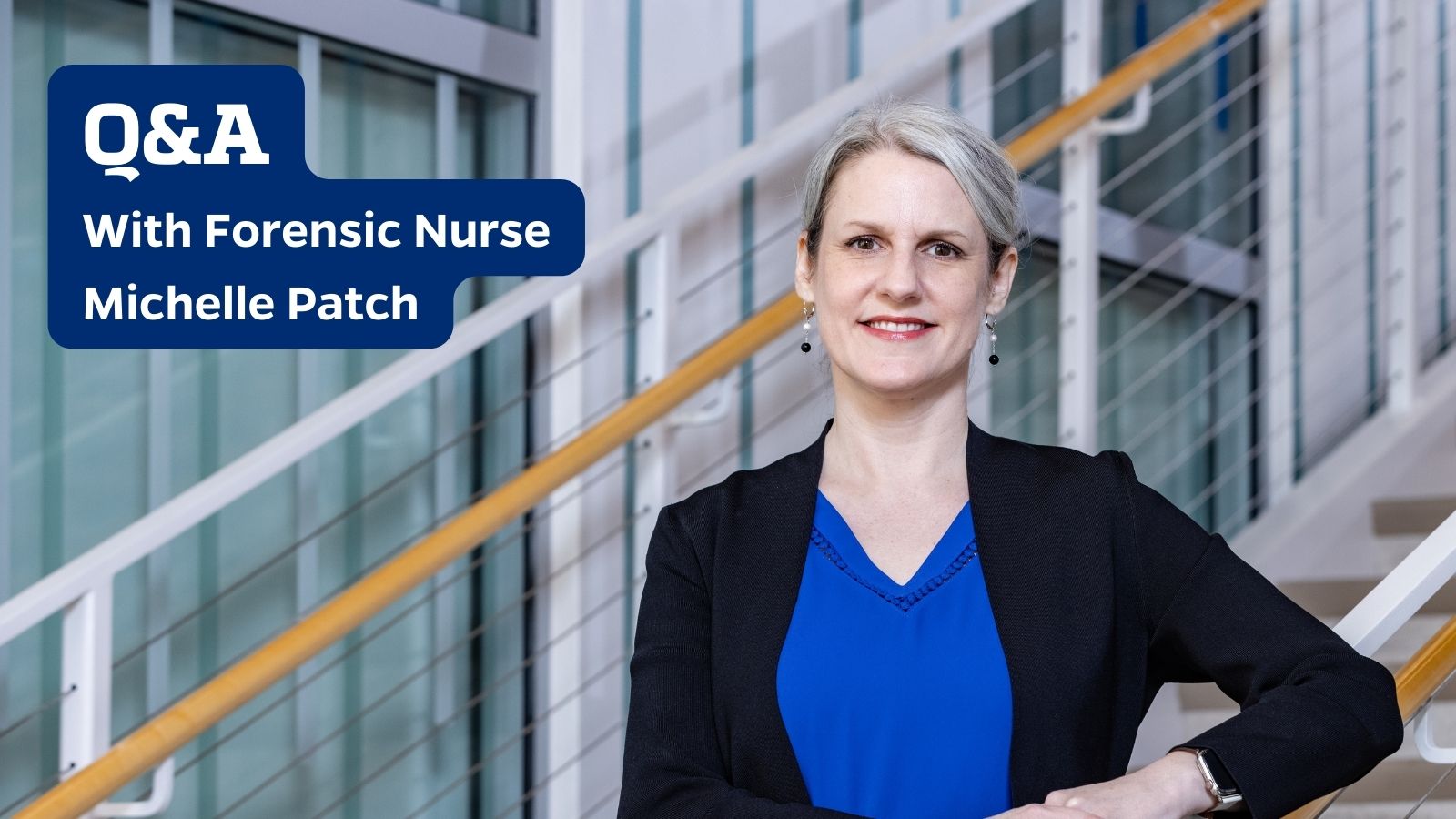Michelle Patch, PhD, APRN-CNS, DF-AFN, FAAN, is an assistant professor at the Johns Hopkins School of Nursing, an adult health clinical nurse specialist, and an advanced forensic nurse. We caught up with Dr. Patch to learn more about forensic nursing and her career and research as a forensic nurse.
Can you explain what forensic nursing is?
Forensic nurses work at the intersection of nursing and the criminal justice and legal systems; they care for patients who have been subject to abuse, violence, criminal activity, liability, and accidents. They conduct evaluations and collect specimens, along with providing care, to support investigations.
One of the most commonly recognized examples of a forensic nurse is a sexual assault nurse examiner. But there are lots of different types of forensic nurses, for example, forensic nurses in the emergency department frequently treat things like gunshot wounds, stab wounds, or wounds stemming from intimate partner violence. We also have nurse coroners who work in death investigation, legal nurse consultants, nurses who work with pediatric or vulnerable adult populations that have experienced abuse, and many more.
Where do you fit in the scope of forensic nursing?
Currently, my primary forensic nursing work is in research. I received my master’s degree from the Johns Hopkins School of Nursing and became an adult health clinical nurse specialist with a forensic focus, then worked in the Johns Hopkins Emergency Department for 10 years as a safety officer.
I came back to get my PhD under my mentor, Jacquelyn Campbell, PhD, RN, FAAN. I studied intimate partner violence, particularly the mechanism of strangulation and how we respond to people who have survived this.
I’m launching a study on acquired brain injury in females who have survived an assault to the head, neck, or face by a partner. The study looks at biofluid biomarkers that might suggest a neurological injury. The idea is that if we can get this information to clinical teams, we can better identify these injuries and more effectively intervene, as many of these patients have repetitive head injuries.
I have also advocated to change policy on strangulation. A couple of years ago, I advocated for a new law that made it a felony in Maryland.
What drew you into nursing as a whole, and specifically forensic nursing? Life experience? Did you become interested later in your nursing career?
I was a Navy nurse and my very first nursing assignment was on a pediatric multi-service ward. I saw many cases of child abuse and neglect. I gravitated to those cases and would even switch assignments with other nurses on the unit. I wanted to be with people at times of intense physical and emotional trauma to support them and help them navigate the health care system.
After September 11, I deployed to Kuwait, and when I returned my husband and I considered our next move (he was also on active duty at the time). It made sense for me to leave the service to have some stability for our family. I heard about this great forensic nursing clinical nurse specialist program at Johns Hopkins, and that’s what I really wanted to do. So that’s how our little family moved to Baltimore.
That interest has always stayed with me. How can I not only care for these patients and families, but also influence policy and generate critical knowledge to guide clinicians? How can we care for them in the best way possible and have positive outcomes?
You were recently named a Distinguished Fellow of the Academy of Forensic Nursing. What does this mean for you?
It’s a great honor. The academy helps me share my work with colleagues and translate my research into practice and policy, which is fantastic. And I’m still in the early stages of my research career, so it’s wonderful to have their support.
It’s also an incredible opportunity to contribute to the forensic nursing field. Most people think of forensic nurses as sexual assault nurse examiners, but through our work with AFN and the Forensic Nursing Certification Board, we have developed and launched certifications for generalists and advanced forensic nursing and are in the process of developing micro-certifications for other forms of abuse and violence.
What trend in forensic nursing has your attention right now?
We are seeing increases in reporting of strangulation as a form of intimate partner violence and sexual violence among the general population. The reason for this is unclear and likely complex, but presents a need for more research in this area. Strangulation can also lead to brain injury from lack of oxygen, and many times assaults that include strangulation also include blunt force trauma to the head, face, or neck.
So, I’ve recently shifted my research focus to brain injury. Existing research centers around male populations, as it often examines people in the military, athletes who play contact sports, and other environments where women are traditionally underrepresented. So there’s this almost hidden group of women that we don’t have a lot of direct research to adequately understand their injuries and guide their care.
Women who experience traumatic brain injury after intimate partner violence don’t have protective gear, training, or other safeguards we associate with traumatic brain injuries, and frequently experience repeated assaults. When we see individuals who are in those situations, we often attribute their symptoms solely to psychological trauma. But if it’s neurological trauma, the treatment needed is different. My work will contribute to the growing information we have about brain injuries from intimate partner violence and hopefully will help inform clinical and legal teams as they care and advocate for this important population.
How does your work shape policy?
Lawmakers need information when they’re developing policy. They’ll ask, “What does the literature say on this?”
Take my work on strangulation, for instance. Many states had not identified strangulation as worthy of a felony charge. I was able to take what I learned from my research and share that with legislators, so they have the information they need to change strangulation’s legal classification.
I’m grateful for the reach my work has had. Recently we filed an amicus brief for U.S. vs. Rahimi, an ongoing Supreme Court case that will determine if a federal law prohibiting firearm possession by people subject to domestic violence protection orders is constitutional. I never thought about contributing to something that would be seen by the Supreme Court, but I’m grateful for the opportunity and experiences that brought me here.
Read More:
- Forging Policy: Associate Dean Jermaine Monk and Education After Affirmative Action
- My First Teachers in Nursing School Weren’t Nurses
- Guatemala Re-visited: Rainwater Project Shows Value of Service-learning Trips
About the Author: Sam DiStefano
Sam DiStefano is the Social Media and Digital Content Coordinator for the Johns Hopkins School of Nursing. Sam works to bring the latest from JHUSON straight to your social media feeds and online reading.


 Birth Companions Talk Doulas and Maternal Health with Mayor Brandon Scott
Birth Companions Talk Doulas and Maternal Health with Mayor Brandon Scott Earth Day: An Opportunity to Address the Environmental Injustice of Plastic Pollution
Earth Day: An Opportunity to Address the Environmental Injustice of Plastic Pollution Forging Policy: How Can Doulas Improve Black Maternal Health?
Forging Policy: How Can Doulas Improve Black Maternal Health? No. 1 Rankings for the School of Nursing and a Pipeline to the “Best Jobs”
No. 1 Rankings for the School of Nursing and a Pipeline to the “Best Jobs” Global Service Learning: Guatemala
Global Service Learning: Guatemala



